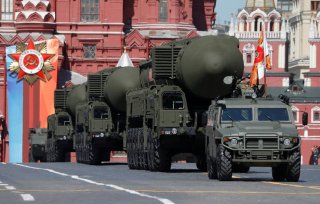Sixty Years After the Cuban Missile Crisis, Biden Should Follow JFK’s Lead
In the current war in Ukraine, the stakes could not be higher.
Would Russian president Vladimir Putin use nuclear weapons if the Biden administration continues to back him into a corner over Ukraine? If Washington persists in pursuing its current policy, the world could learn the answer to that terrifying question.
Earlier this year, Putin ordered Russia’s strategic nuclear forces to be placed on high alert. Western governments quickly denounced the move as unacceptable and immoral, calling it “unprovoked escalation.” Over the summer, the Russian leader again threatened the use of nuclear weapons.
Some Americans are old enough to remember the last time the world came this dangerously close to a nuclear confrontation: the Cuban Missile Crisis of 1962—exactly sixty years ago. What is striking is how differently the American president at the time, John F. Kennedy, and President Joe Biden have responded to their respective nuclear crises.
When confronted with the reality of the Soviets placing nuclear missiles in Cuba, Kennedy responded with an abundance of caution, going to great lengths to resolve the crisis and without provoking an escalatory response from Moscow. Grasping the gravity of the situation, he did not elect to invade Cuba—against the advice given him by his joint chiefs of staff—thereby avoiding putting his Soviet counterpart, Nikita Khrushchev, in a position where he might contemplate the use of nuclear weapons. He instead searched high and low for a way out of the crisis that would also allow Khrushchev to save face with the Russian populace, ultimately cutting a deal that involved the removal of Soviet missiles from Cuba in exchange for the withdrawal of American Jupiter missiles in Europe. The strategic foresight, creativity, and patience demonstrated by Kennedy enabled the peaceful de-escalation of the crisis and possibly averted nuclear catastrophe.
In the current crisis, Putin has been crystal clear on when he would use nuclear weapons: if Russia’s existence were threatened. He likewise declared on another occasion that Russia would use nuclear weapons “if required to protect our sovereignty.” Putin has been speaking in unambiguous terms.
One might think that the gravity of the situation would have induced a great deal of caution and introspection in Washington regarding its policies toward Moscow, just as the Cuban Missile Crisis did sixty years ago. However, Putin’s nuclear escalation seems to have produced quite the opposite effect. The Biden administration has behaved as if Putin’s threats were simply hallow bluster, despite the fact that Putin has a history of following through with his promises, as the Ukraine war itself makes clear. Unfortunately, when it comes to the war over Ukraine, Biden has seemingly thrown all the lessons of the Cuban Missile Crisis out the window. Indeed, he is approaching the conflict in a manner completely antithetical to how Kennedy handled the Cuban Missile Crisis. Whereas Kennedy sought to ameliorate tensions with Moscow, Biden is foolishly upping the ante in the naïve belief that Russia will back down.
The president has steadily escalated the West’s efforts against Russia. When it became clear that Moscow was underperforming in its war effort and that Kyiv was punching above its weight on the battlefield, the Biden administration shifted its rhetoric on its ultimate goals in Ukraine from stymieing the Russian offensive to winning the war outright. At the same time, Washington greatly increased military support for Ukraine with the goal of inflicting a decisive defeat on Russia.
Unfortunately, further Western success on the battlefield is likely only to intensify feelings of desperation in Moscow. Senior figures in the Biden administration, especially Secretary of Defense Lloyd Austin, have spoken favorably of maximizing the degradation of Russian power—statements which Moscow no doubt perceives as an existential threat to its survival. Provoking this sense of despair is precisely what the American leadership should be actively avoiding, for it is precisely under these conditions that Moscow would be most likely to use nuclear weapons.
To be clear, we do not believe that Russia using nuclear weapons is likely. But it is now a distinct and growing possibility. To avoid a scenario where Putin might consider using nuclear weapons, the Biden administration must show a willingness to practice one of the most fundamental ideas in diplomacy: placing oneself in the shoes of the adversary. The skill to consider events from an opponent’s perspective demonstrates strategic and sophisticated thinking—a necessary component of effective and informed decisionmaking. And in the current war in Ukraine, the stakes could not be higher. Washington should go to great lengths to reassure Putin that it does not seek Moscow’s ruin. It is impossible to do that, of course, if this is, in fact, the ultimate goal.
To this end, Biden would be wise to pull a page out of Kennedy’s playbook when the latter was presented with a similar opportunity to put Moscow into a situation where it might contemplate the use of nuclear weapons. Unfortunately, whereas Kennedy understood the potentially devasting consequences of backing the Soviet Union into a corner, Biden appears to be pursuing this very strategy. The world can only hope that Washington will change course before it is too late.
Nilay Saiya is assistant professor of public policy and global affairs at Nanyang Technological University.
Rahmat Wadidi is a graduate student at the Rajaratnam School of International Studies.
Image: Reuters.

